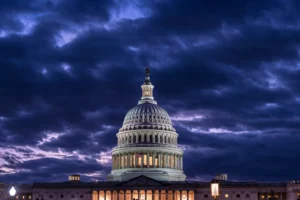LEGISLATIVE ROUNDUP: State Poised to Restrict Abortion, Limit Transgender Athletes (Part 2)
Gov. Gordon has yet to act on controversial bills
- Published In: Politics
- Last Updated: Mar 09, 2023
By Shen Wu Tan, Jacob Gardenswartz and CJ Baker
Special to the Wyoming Truth
The familiar topics of Medicaid expansion and abortion returned to the Wyoming Legislature this winter, and lawmakers took action.
Following up on legislation from last year, lawmakers passed two bills that further restrict abortion in Wyoming and another that will expand Medicaid coverage for new mothers.
Senators and representatives also considered several pieces of legislation related to transgender issues, though the only notable bill to pass was one banning students assigned male at birth from competing in female sports in middle and high school.
Additionally, the Legislature boosted alert systems for missing persons and prohibited child marriages, with few exceptions.

A wrap up of key legislation related to social issues and public health follows below. The first part of the Wyoming Truth’s series covered property taxes and election issues.
Medicaid expanded, but only for mothers
Despite advocates’ hopes that this year might be different, a proposed expansion of Medicaid went the same way it has every time the measure has come up over the past decade. Though a bill to expand access to the health insurance program for low-income Wyomingites passed through committee, House Majority Floor Leader Rep. Chip Neiman (R-Hulett) decided not to bring the measure up for a full vote, ultimately dooming its prospects.
But it wasn’t all bad news for those who support expanding government health insurance coverage. Lawmakers did approve House Bill 4, which extends the length of time qualifying low-income mothers can receive government-funded postpartum maternity care.
Before the COVID-19 pandemic, qualifying mothers could only receive up to 60 days of Medicaid insurance coverage, but that number was extended as the pandemic set in. Now, the roughly one-third of Wyoming moms covered by Medicaid can continue receiving benefits for up to a year after giving birth, a policy that will stay in place through at least 2027.
In his closing address to the Wyoming Senate, Gov. Mark Gordon touted the measure, saying that the “ability to make sure that our mothers are protected for a full year” was “truly a pro-life bill.”
New abortion restrictions — and likely legal challenges
Amid the ongoing saga over the fate of reproductive rights in the Equality State, lawmakers passed two more measures aimed at cracking down on abortion. Senate File 109 criminalizes the prescription, sale or use of medications to induce abortion, while House Bill 152 seeks to circumvent the court challenges to 2022’s near-total abortion ban, which is currently enjoined from being enforced amid ongoing legal disputes.

Right now, abortion remains legal in Wyoming up to the point of viability. That’s due, in part, to a temporary restraining order by a Teton County judge that halted last year’s abortion ban from going into effect. A trial for that case was set to begin this December, though the judge has said the case is likely to be impacted by these new measures if they become law. Gordon has the same 15-day window to sign or veto them, otherwise they’ll take effect without his signature.
Controversial transgender bills see mixed success
Republicans nationwide have sought to limit the ability of doctors and medical professionals to provide gender-affirming care to transgender and gender nonconforming youth, and Wyoming was no exception. GOP lawmakers pushed two measures — Senate Files 111 and 144 — to ban or even criminalize the practice, over the objection of several doctors who testified that certain interventions are needed to protect children’s mental health. Ultimately, despite a push from the Wyoming Freedom Caucus, neither bill made it through the House.
However, one measure concerning transgender youth did squeak through the Legislature: Senate File 133. If signed into law, it will prevent students who are assigned male at birth from participating in girls’ sports in grades seven through 12, even if the student transitioned or otherwise identifies as a female.
But Gordon hasn’t signed the measure yet, and transgender rights supporters, including the ACLU of Wyoming, are calling on him to veto it. Gordon has 15 days to do so, otherwise it becomes law without his signature. A spokesman for the governor told the Wyoming Truth he’ll consider the measure “carefully,” but declined to elaborate further.
Acknowledging Wyoming’s high suicide rate
If you need mental health services, lawmakers took action to try and support more sustainable funding for 24/7 local suicide prevention resources. House Bill 65 creates a trust fund for 988, the mental health crisis hotline system that launched nationwide last summer. To Gordon’s disappointment, lawmakers declined to put any money in the fund, but it can receive federal grants, gifts, donations and other contributions, and could eventually provide financial backing for call centers and other suicide prevention services.
“Wyoming has the distinction of leading the nation in suicides in the per capita basis,“ said Sen. Mike Gierau (D-Jackson). “The bottom line, the good news is that it [the bill] did pass. And now people are going to have another avenue to call.”
In 2021, Wyoming saw 189 suicides, or 32.8 per 100,000 people — more than twice the nationwide rate of 13.5 suicides per 100,000 people.

Expanding Wyoming’s missing person alert systems
Missing person alerts in Wyoming will no longer be primarily limited to children. With the passage of House Bill 18, the state’s missing person alert systems will expand to include vulnerable adults, such as someone with dementia and others who fall outside the scope of Amber Alert criteria. It also requires that state law enforcement agencies assist local tribes with creating, integrating or operating an alert system if so desired.
“ … To include another system that really focuses on adults, where the Amber Alert system really focuses on children and adolescents, is important,” said Rep. Lloyd Larsen (R-Lander), who voted in favor of the bill. “It just made this whole missing person thing mature even a little more to cover a broader spectrum of our society that is sometimes impacted, maybe and maybe not by malicious acts.”
State law enforcement agencies recorded 388 missing person cases in 2021, an October 2022 report from the Wyoming Survey and Analysis Center shows. Some people were reported missing multiple times in a year, so a section of the report focused on those unique individuals reported as missing. Of those cases, 57 individuals or 15% were identified as American Indian or Alaska Native.
Bills protect the Indian Child Welfare Act
Legislators made efforts to protect the Indian Child Welfare Act (ICWA), approving House Bill 19 to establish an ICWA task force and Senate File 94 to codify the federal act in state law; ICWA is currently being challenged in the U.S. Supreme Court.
The task force will include a representative from the Wyoming Department of Family Services, two people recommended by the Eastern Shoshone Business Council and two recommended by the Northern Arapaho Business Council, among others.
“The ICWA task force is a necessary piece to help identify how Wyoming can best tailor the ICWA law to its individual needs,” said Rep. Sarah Penn (R-Lander). “We’ve had since 1978, when the ICWA was established, to see the law in practice. I would like to see it better prioritize the needs and wellbeing of the child, and this will offer the opportunity to look for ways to fulfill that desire. We must make sure this fully supports the child first.”

Meanwhile, Gordon plans to sign SF 94 today (Thursday). The legislation codifies ICWA into Wyoming statutes and details requirements and procedures for placing Native American children in shelter care or for adoption.
“I believe the impact of these two bills, working together, is to create a bridge to continue protecting Indian children in the event the federal ICWA law is struck down by the United States Supreme Court,” Rep. Ken Chestek (D-Laramie) said. “SF 94 continues the existing protections as a state law, while HB 19 creates a process for a comprehensive review of how ICWA operates and a means to recommend any changes that might be advantageous for everybody concerned.”
New limits on child marriage
Wyoming was one of the few states without a minimum age to marry. Not anymore. Now, you won’t be able to tie the knot in Wyoming unless you’re at least 18 years old, with few exceptions. Gordon signed House Bill 7 into law last month.
“It means residents under 16 years of age can’t get married, residents who are 16 and 17 can get married with parental or judicial consent,” said Rep. Dan Zwonitzer (R-Cheyenne), the bill’s sponsor. “As the bill applies to less than 25 Wyomingites a year, I don’t expect impacts.”
The legislation passed both the Senate and House, although it did face some resistance. The Wyoming Republican Party raised “concerns about constitutional rights” and a few legislators argued the bill was unnecessary, since state statistics showed very low rates of underage marriage.
Patients gain right to see clergy, other visitors
If Wyoming is hit with another pandemic or other public health emergency, two new laws aim to ensure your loved ones and clergy can visit you.
House Bill 127 requires hospitals, nursing homes and other health care facilities to allow visits from rabbis, pastors, priests, ministers or any other religious counselors requested by the patient. Senate File 80, meanwhile, says facilities must also allow other visitors, but that’s subject to restrictions and limitations that the facilities or the federal government choose to impose. The bills came in response to the suspension of in-person visits as part of COVID-19 precautions.

“Just talking even with a lot of medical professionals, we realize that maybe we made some mistakes and learned some lessons,” said Rep. Abby Angelos (R-Gillette), who sponsored HB 127. “And here we’re trying to address that.”
The Legislature considered going further in its response to the pandemic — with bills opposing vaccine and mask mandates and rejecting the jurisdiction of the CDC and WHO — but those efforts failed.
Check back tomorrow for part 3.













